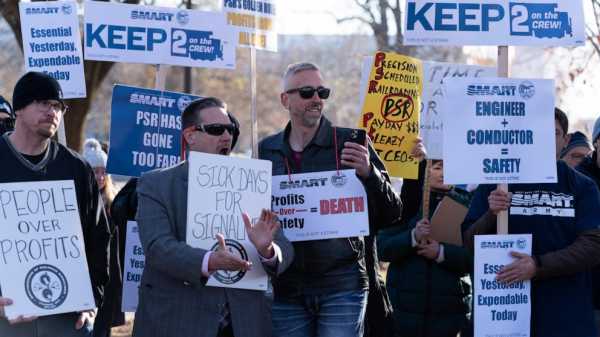
OMAHA, Neb. — Railroad workers who are fed up with demanding work schedules and disappointed in the contract they received aired their frustrations this week at rallies across the country and in a leadership vote at one of their biggest unions.
Workers gathered in Washington D.C. and nearly a dozen other locations across the country Tuesday to emphasize their quality of life concerns and fight for paid sick leave after Congress intervened in the stalled contract talks earlier this month and imposed a deal on four unions that had rejected it. And thousands of engineers voted to oust their long-time union president although that result won't be final until next week.
The five-year contract that roughly 115,000 workers in 12 unions received includes 24% raises, $5,000 in bonuses and one additional paid leave day, but the unions say it didn't do enough to address workers' quality-of-life concerns. President Joe Biden urged Congress to get involved because the potential economic damage that would come with a railroad strike was too great to bear, but their action left many workers disappointed because lawmakers opted not to require the railroads to add sick time.
“The American people should know that while this round of collective bargaining is over, the underlying issues facing the workforce and rail customers remain,” said the Transportation Trades Department coalition of the AFL-CIO that includes all the rail unions. “Over the last seven years, the freight railroad industry has moved to a business model that has cut their workforces to the bone, devastated worker morale by creating unsustainable working conditions across the industry, and put the safety of their workers and the American public at risk.”
The unions have said that the roughly 45,000 job cuts across the industry as railroads overhauled their operations over the past several years have increased the workload for everyone who remains and prompted the railroads to adopt strict attendance policies that make it hard for workers to take a day off. Railroads say they don't need as many workers as they used to because they have cut down on the number of trains and locomotives they are using by relying on longer trains with a mix of freight that run on a tighter schedule.
The railroads did agree as part of the contract to try to improve the way regular days off are scheduled through ongoing additional negotiations at each railroad. But it's not yet clear how much of a difference those changes will make to engineers and conductors who say they are now essentially on call 24-7.
One of the other concessions railroads made was to offer engineers and conductors three unpaid days off a year to tend to medical events as long as they schedule their appointments at least 30 days ahead of time.
The engineers union narrowly approved the deal while the union that represents conductors rejected it. But more than half of the Brotherhood of Locomotive Engineers and Trainmen union members who voted this week backed challenger Eddie Hall over Dennis Pierce, who had led the union since 2010.
BLET officials say those results won't be certified until Monday after any challenges to the vote are resolved. Pierce, who was one of the leaders of the large bargaining coalition that represented the unions in the contract talks with all the major freight railroads over the past three years, declined to comment on the election results.
Hall said he thinks the vote clearly shows that engineers just aren't “satisfied with our leadership,” The win is remarkable given that Hall was little known among the union nationally before he was nominated by workers in his division in Arizona.
“This is like a club fighter knocking out Muhammad Ali," Hall said. "I’m a vice local chairman out of Division 28 in Tucson. This is unprecedented. It’s never happened before and it’ll probably never happen again.”
Hall said there is definitely still a lot of work to do to help improve workers' quality of life, but he doesn't have a long plan of what he will do if he does take office. He said the first thing on his agenda will be getting out and meeting with engineers all across the country to listen to their concerns.
Regardless of who leads the BLET for the next four years, all the unions have pledged to continue pressing the railroads to add sick time and ease some of their restrictive rules.
Sourse: abcnews.go.com






